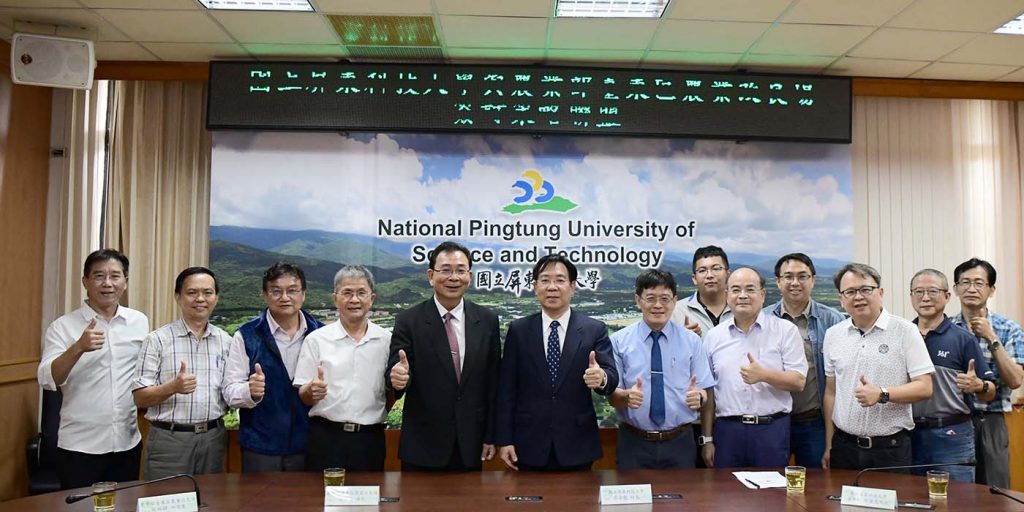In order to achieve the target of net-zero carbon emissions by 2050, Assistant Professor Tsu Che Lin of the NPUST Department of Plant Industry and his team joined up with researchers from the Taitung District Agricultural Research & Extension Station to promote the research and development of “Strategies to Optimize Rice Production Models in Tropical Environments under Climate Change”. The goal is to establish a strategy that is different from traditional, constant field flooding production method, which causes high greenhouse gas emissions. The old method is to be replaced by a water-saving model which alternates between dry and wet conditions and uses low-carbon rice varieties. Tests have found that this model can save water and reduce carbon emissions by more than 50%. President Chin-Lung Chang of NPUST and Director Hsin-Yen Chen of Taitung District Agricultural Research & Extension Station signed a strategic alliance agreement on behalf of both parties on October 17, 2023 in the Second Meeting Room of the NPUST Administration Building. College of Agriculture dean Jue-Liang Hsu and a number of colleagues from the university and Research & Extension Station were also present to witnessed the event.
In his speech, NPUST President Chin-Lung Chang said, “carbon reduction and carbon neutrality have become prominent areas of study. NPUST prides itself on being a leader in the development of agricultural science and technology. Through the technology that will be developed through this cooperation with the Taitung District Agricultural Research & Extension Station we hope to establish and promote a new model which can be uses by farmers across Taiwan and New Southbound countries in the future—and that perhaps even the whole world can benefit from it.” Director Hsin-Yen Chen of Taitung District Agricultural Research & Extension Station said, “in the context of climate change, rice is the largest food crop in Taiwan, and if traditional farming methods are used, it will result in high levels of greenhouse gases emissions. In recent years, attempts have been made to cultivate rice using alternating dry and wet methods to save water and reduce carbon emissions. Our current cooperation depends on the professional testing and surveying of NPUST, so we can focus more on the improvement and promotion of the farming methods. I believe it will be extremely helpful for carbon reduction in rice fields in the future.”
In order to delay the effects climate change have on agricultural cultivation, the NPUST Department of Plant Industry and the Taitung District Agricultural Research & Extension Station are jointly promoting the research and development of optimal rice production models for tropical environments under climate change. In the future, the will cooperate closely on field experiments. NPUST will provide tutoring support and experimental data analysis related to water-saving cultivation, carbon sequestration, and carbon emission detection technologies suitable for the tropics. The Taitung Extension Station will be responsible for field experiments and surveys. Both parties will work together to apply the actual results of their R&D in rice fields and will move towards increasing agricultural resilience.
Rice is an important food and economic crop in Asia. However, the field flooding production process causes the microorganisms in the soil to undergo anaerobic decomposition and emit methane. The large-scale application of chemical fertilizers also causes the emission of nitrous oxide. Meanwhile, highly mechanized planting processes also produce carbon emissions. For these reasons the team set their focus on ways to reduce the greenhouse gas emissions caused by traditional rice cultivation.
In recent years, the United Nations Climate Change Conference has proposed ways to improve carbon emissions in existing industries to achieve carbon neutrality. Various industries are currently stepping up efforts to develop strategies to reduce greenhouse gas emissions. Among them, agriculture is the industry that generates the most carbon sinks for other industries to achieve carbon neutrality. As a sustainable comprehensive university that laid its foundation on agriculture, NPUST has a duty to optimize rice farming models so they can meet the needs of today’s environment and trends. In the collaborative partnership between NPUST and the Extension Station, their aim is to go beyond simply finding new farming models and establishing sustainable concepts, but also hope to enable farmers who are committed to rice cultivation to more confidently adhere to their practices and overcome the challenges of the era.

